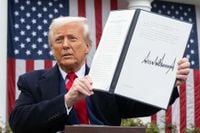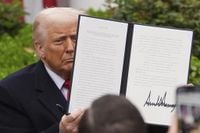U.S. stocks nosedived in after-hours trading on April 2, 2025, following President Donald Trump's announcement of sweeping tariffs on imported products from a wide range of countries. The SPDR S&P 500 ETF (SPY) declined more than 2%, while the SPDR Dow Jones Industrial Average ETF (DIA) fell 1%. The Invesco QQQ Trust (QQQ), which tracks the Nasdaq 100, dropped as much as 3%. The tariffs, set to take effect on April 5, will impose a minimum 10% tariff on nearly all countries, along with country-specific tariffs that could be much higher.
In a press conference from the White House Rose Garden, Trump stated, "We will charge them approximately half of what they are and have been charging us." He emphasized that the tariffs would be applied to America’s largest trading partners, including a 20% rate on imports from the European Union, 26% on Japanese imports, and a staggering 34% on imports from China. This announcement has raised concerns about a potential global trade war that could further stress the already fragile U.S. economy.
As the news broke, shares of major companies were significantly affected. Apple (AAPL), which has a substantial manufacturing presence in China, Vietnam, and India, saw its stock decline by about 6%. Electric vehicle maker Tesla (TSLA) was down around 4%, while retail giants Amazon (AMZN) and Walmart (WMT) slid approximately 5% and 6%, respectively. Apparel and footwear manufacturers were among the hardest hit, with Nike (NKE) shares slumping 7% and Swiss shoemaker On Holding (ONON) plummeting 17%. Canada-based Lululemon (LULU) dropped more than 11%, while Deckers Outdoor (DECK) fell nearly 12%.
The market's reaction reflects the heightened fears of inflation and a slowdown in economic growth due to the tariffs. Treasury yields tumbled, with the 10-year Treasury yield dropping to 4.13%, nearing its lowest level this year. Economic analysts warn that these tariffs could lead to higher prices for consumers and potentially push the economy into recession.
Trump's administration has claimed that the tariffs will boost U.S. revenue and expand the American manufacturing sector. However, economists caution that the burden of these tariffs will likely fall on American consumers, who will face higher prices as a result. Mark Zandi, chief economist at Moody's Analytics, noted, "The bulk of tariffs are borne by American consumers in the form of higher prices." He further stated that the combination of tariffs and retaliatory measures could weigh heavily on the economy.
In the aftermath of the announcement, stock futures also plummeted. Dow Jones Industrial Average futures lost 1,069 points, or 2.5%, while S&P 500 futures dropped 3.6%, and Nasdaq-100 futures lost 4.5%. As traders digested the implications of Trump's tariff policy, many expressed concern over the unexpected severity of the measures. Art Hogan, chief market strategist at B. Riley Wealth Management, remarked, "What was delivered was as haphazard as anything this administration has done to date, and the level of complication on top of the ultimate level of new tariffs is worse than had been feared and not yet priced into the market."
The effective tariff rate on U.S. imports had already jumped to 8.5% from 2.3% in 2024, and with these new tariffs, the effective rate for China will now reach 54% when accounting for additional duties already in place. This escalation in trade tensions has led many analysts to predict further declines in the stock market, with the S&P 500 on course to fall back into correction territory during regular trading hours on April 3.
Internationally, stocks in countries like India, Japan, and China also faced declines following the announcement. The iShares MSCI India ETF (INDA) dropped around 2.8%, while the iShares MSCI Japan ETF (EWJ) declined 3.2%, and the iShares MSCI China ETF (MCHI) fell about 2.4%. Additionally, the VanEck Vietnam ETF, which tracks Vietnamese stocks, tumbled 3.2% in late trading, while the Global X MSCI Vietnam ETF dropped 6.5%. The U.S. has also imposed a significant 46% tariff on all goods imported from Vietnam.
As the market grapples with the implications of these tariffs, some analysts suggest that the uncertainty surrounding trade policies could lead to increased volatility in the coming months. Scott Helfstein, head of investment strategy at Global X, commented, "The tariff news does not alter the long-term secular trends that will continue to drive the U.S. forward," adding that while tariffs may create short-term challenges, growth opportunities remain in sectors like AI and infrastructure.
In summary, President Trump's announcement of sweeping tariffs has sent shockwaves through the markets, leading to significant declines in stock prices and raising concerns about the potential impact on the U.S. economy. As the tariffs take effect in the coming days, investors will be closely monitoring the situation for further developments and potential retaliatory measures from other nations.








